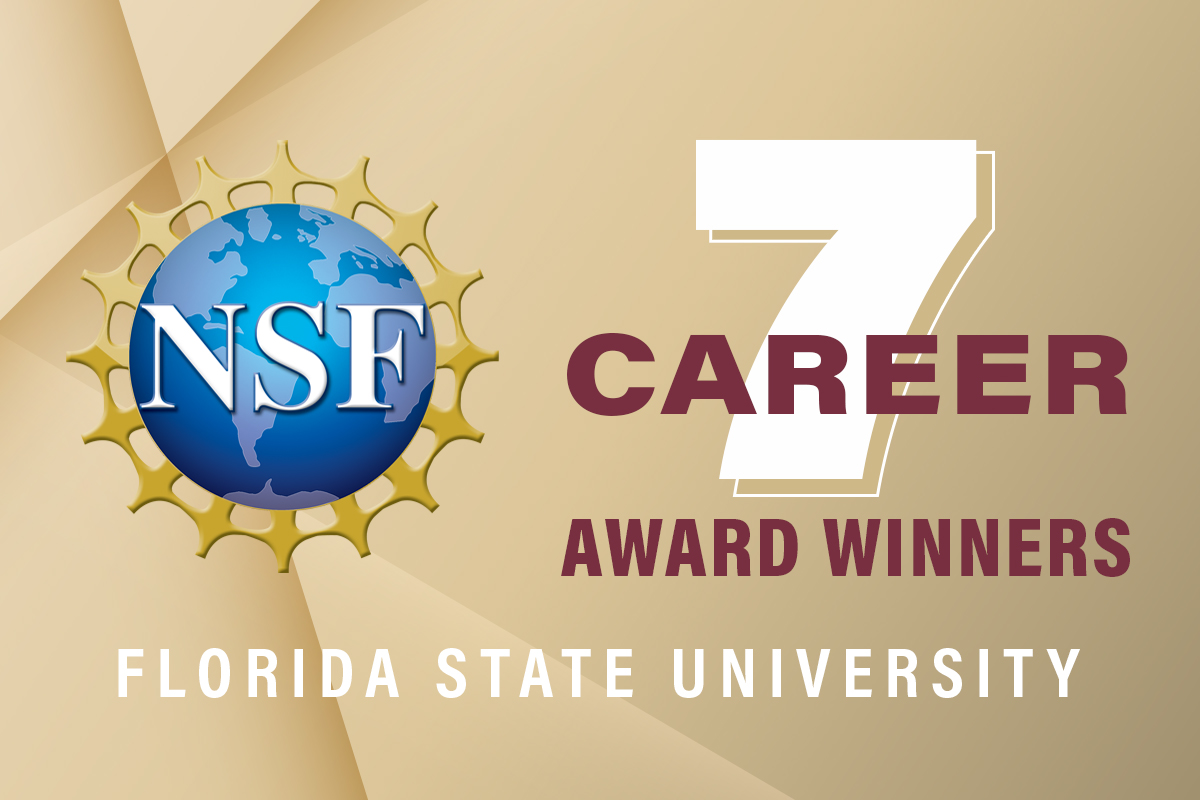Record number of FSU faculty win prestigious NSF CAREER awards

Seven Florida State University researchers have earned the National Science Foundation’s prestigious CAREER awards, which recognize up-and-coming researchers and help recipients build their research and teaching portfolios.
The award provides funding for the researchers’ labs and gives them an opportunity to work closely with NSF staff on developing their professional endeavors. Seven recipients marks a record for FSU; the previous high was five recipients in 2018.
“We are so pleased that the NSF has recognized the incredible work of these seven young superstar faculty members,” said Mark Riley, FSU’s interim vice president for research. “This award reflects on their fabulous accomplishments thus far, but also shows faith in the brilliant work they will conduct in the future. We are excited to see what they will do in the years to come.”
The recipients are:
Alyssa Atwood, assistant professor in the Department of Earth, Ocean and Atmospheric Science
Atwood aims to fill a key data gap in historical climate observations by developing new coral-based temperature records of the past from the equatorial Pacific Ocean. These reconstructions will provide unprecedented detail on how ocean temperatures and extreme events have evolved in this region over the last 3,000 years. Atwood received her doctorate from the University of Washington in 2015 and worked as a postdoctoral researcher at the University of California – Berkeley and the Georgia Institute of Technology before joining FSU as an assistant professor in 2019.
Feng Bao, assistant professor in the Department of Mathematics
Bao designs algorithms and uses a variety of mathematical techniques such as differential equations and computational math to resolve problems that scientists and engineers encounter in their daily work. Bao is developing scalable, efficient algorithms specifically for supercomputers that work with large amounts of neutron data and another algorithm for computing quantum material. After earning his doctorate from Auburn University in 2014, Bao took a postdoctoral research position at Oak Ridge National Laboratory and worked as an assistant professor at the University of Tennessee at Chattanooga. Bao joined FSU’s faculty in 2018 and is the first FSU mathematics faculty member to ever earn a CAREER award.
Shayok Chakraborty, assistant professor in the Department of Computer Science
Chakraborty is developing sophisticated artificial intelligence systems that can operate under limited human supervision. Active learning algorithms alleviate many data annotation-related challenges presented by modern machine learning applications by automatically identifying salient and informative samples from large amounts of data, which need to be labeled manually. Chakraborty received his doctorate from Arizona State University in 2013 and worked as an assistant research professor and associate director of ASU’s Center for Cognitive Ubiquitous Computing Laboratory. Before joining FSU in 2017, he worked as a postdoctoral researcher at Carnegie Mellon University and Intel Labs.
Amal Ibourk, assistant professor in the College of Education
Ibourk’s project aims to support pre-service and in-service teachers in professional development that will prepare them to teach about climate change in community-specific ways. The newly designed lessons will focus on issues related to local contexts, such as how climate change disproportionately affects vulnerable communities in Florida. Ibourk received her doctorate from Michigan State University in 2015 and worked as a postdoctoral researcher there before coming to FSU in 2017.
Guangxin Ni, assistant professor in the Department of Physics
Ni studies unique and exotic electronic and optical phenomena arising in solids that are only one or, at most, a few layers of atoms thick. These 2D crystals contain rich physical properties due to their reduced dimensionality and quantum confinement. Ni uses lasers to generate intense beams of light at different wavelengths that interact with the electrons in the solids at the nanometer-length scales and applications of this research lie in areas such as light-matter interactions, novel optical and electronic properties of new quantum materials. Ni earned his doctorate from National University of Singapore in 2013 and worked as a postdoctoral researcher at the University of California San Diego and as a postdoctoral research scientist at Columbia University before joining FSU’s faculty in 2020.
Ralm Ricarte, assistant professor in the FAMU-FSU College of Engineering
Ricarte works with vitrimer, a new type of polymer that is insoluble while still flowing at high temperatures. He wants to determine the molecular design principles of vitrimer gels, and by optimizing the interaction of the polymer and solvent, he hopes to unlock a new generation of temperature responsive polymer materials with adaptable nanostructures. Through understanding how structural parameters affect the behavior of the material, the gels will be developed into technology used to create items such as safer batteries. Ricarte received his doctorate in 2016 from the University of Minnesota and worked as a Marie Curie and PRESTIGE postdoctoral fellow at ESPCI Paris in France before joining the FAMU-FSU College of Engineering faculty in 2019.
Allison Wing, assistant professor in the Department of Earth, Ocean and Atmospheric Science
Wing will continue her investigation of the role of tropical cloud systems in the water cycle and climate, specifically how the clustering of convection influences heavy rainfall events and how changes in the properties of clouds and the way they clump together affects the planet’s future warming. Wing earned her doctorate from Massachusetts Institute of Technology in 2014 before serving as a postdoctoral research fellow at Columbia University’s Lamont-Doherty Earth Observatory. She joined FSU’s faculty in 2017.
